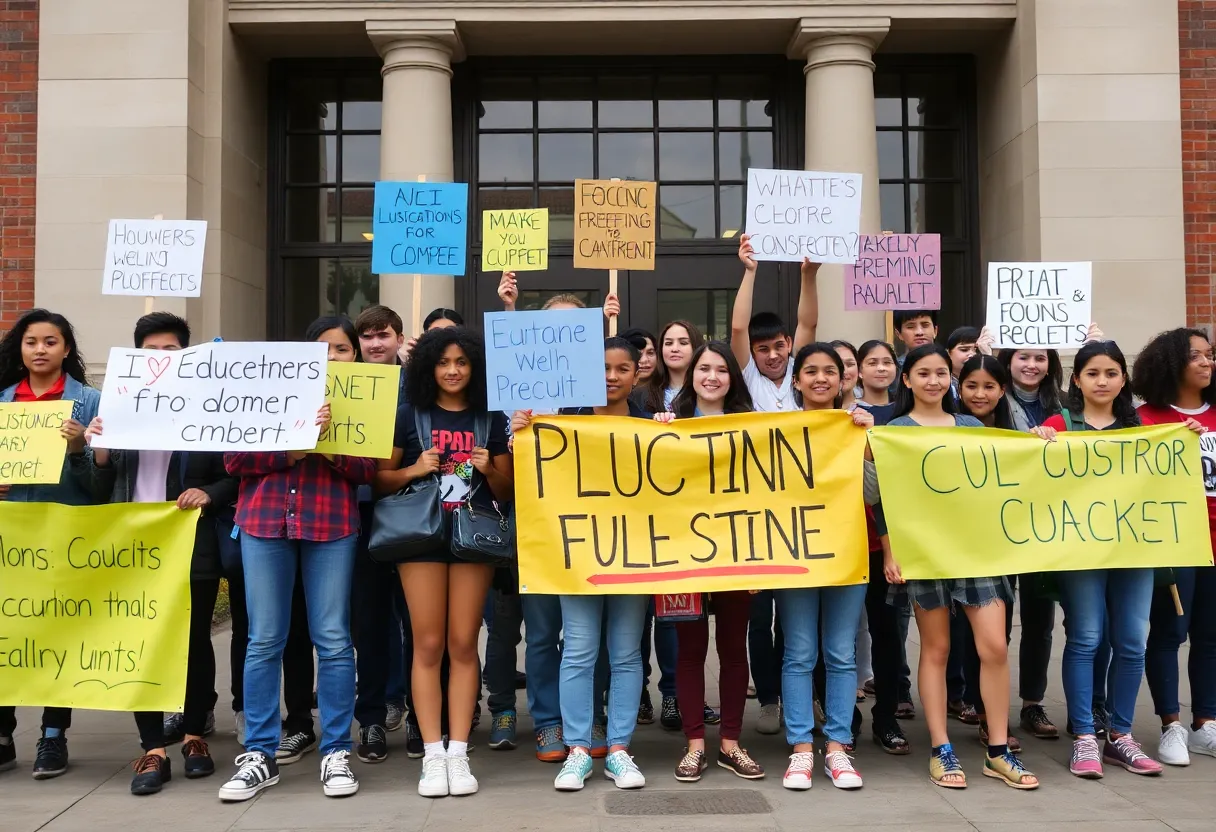News Summary
A controversial bill passed by Nashville’s Senate Education Committee has raised alarm over the potential education options for undocumented students. If signed into law, school districts could charge tuition to undocumented children, challenging the ruling from Plyler v. Doe which ensures the right to public education regardless of immigration status. Critics warn that the bill could lead to significant educational inequities and affect community dynamics, prompting widespread protests and advocacy for education equity.
Controversial Bill in Nashville Targets Undocumented Students’ Education
Nashville finds itself at the center of a heated debate following the recent approval of a contentious bill that could change the educational landscape for undocumented students across Tennessee. The Senate Education Committee voted by a narrow margin of 5-4 to allow school districts the option to charge tuition to undocumented children, raising significant concerns among educators, students, and community advocates.
What’s at Stake?
This proposed bill, sponsored by key Republican figures in the state, directly challenges the longstanding ruling from 1982 known as Plyler v. Doe, which guarantees all children the right to public education regardless of their immigration status. If this bill becomes law, undocumented K-12 public and charter school students would be required to prove their immigration status, with the looming possibility of facing denial of education based on their ability to pay tuition.
Behind the Bill
The motivation behind this bill, according to its proponents, is grounded in fiscal responsibility. The bill’s supporters claim that the increasing costs of providing education for English as a Second Language (ESL) programs— which surged from $94 million in FY 2016 to $198 million in FY 2018— are straining state resources. However, critics argue that the state does not currently track student citizenship status, making it nearly impossible to accurately assess the financial implications of undocumented students in Tennessee’s educational system.
Voices of Concern
Amidst the discussions around tuition, many community members are concerned about the potential consequences of denying education to children based on their immigration status. This bill could have grave implications for the future of a generation, leading to a rise in uneducated youth and a corresponding decline in community health. The sentiment is echoed across the city, with many activists passionately advocating for the rights of all children to access education, regardless of their background.
Community Outrage
The response from the public has been swift and passionate. Hundreds of protesters, largely organized by community organizations, disrupted the Senate committee meeting, making it clear that there is strong opposition to this legislation. The phrase “education for all” resonated through the halls as voices from different backgrounds came together to emphasize the importance of accessible education for every child.
Effects on Families and Communities
Educators and advocates have raised alarms about what this bill could mean for immigrant families living in Tennessee. A teacher and local activists pointed out that such a measure could push these families to seek education elsewhere, resulting in significant shifts in community dynamics. The potential migration of immigrant families could affect not only the demographic landscape but also the richness of cultural diversity that Nashville prides itself on.
A Broader Trend
This bill is not an isolated incident but is part of a broader trend among Tennessee Republicans to challenge existing Supreme Court precedents regarding immigration. The implications of this bill could extend beyond state lines, serving as a potential model for similar legislation in other Republican-led states aiming to impose stricter regulations on undocumented individuals.
Next Steps
As the conversation continues, many are left wondering what the future holds for undocumented students in Nashville and throughout Tennessee. The committee’s decision has sparked a dialogue about the rights of children and the responsibilities of the state to provide education to all its residents. With ongoing protests and strong community sentiment against the bill, it is clear that the fight for education equity is far from over. Nashville sits at a crossroads, and the choices made now will impact countless lives for years to come.
Deeper Dive: News & Info About This Topic
HERE Resources
Tennessee Schools Face Controversial Immigration Bill
Trump’s Directive to Eliminate Federal Benefits for Undocumented Immigrants
Oklahoma Education Board Approves Enrollment Proposal
Additional Resources
- Nashville Banner: Tennessee Immigration Education Bill
- Wikipedia: Education in the United States
- News Channel 5: Tennessee Chambers Divided Over Bill
- Google Search: education for undocumented students Tennessee
- Tennessee Lookout: GOP Bill to Bar Immigrant Kids from Public Schools
- Encyclopedia Britannica: Supreme Court of the United States
- WKRN: Tennessee Bill Would Allow Schools to Deny Enrollment
- Google News: immigration education Tennessee
- DNJ: Trump Tennessee Anti-Immigration Policies
- Google Scholar: education immigration law Tennessee
Author: HERE Nashville
The NASHVILLE STAFF WRITER represents the experienced team at HERENashville.com, your go-to source for actionable local news and information in Nashville, Davidson County, and beyond. Specializing in "news you can use," we cover essential topics like product reviews for personal and business needs, local business directories, politics, real estate trends, neighborhood insights, and state news affecting the area—with deep expertise drawn from years of dedicated reporting and strong community input, including local press releases and business updates. We deliver top reporting on high-value events such as CMA Fest, Bonnaroo Music & Arts Festival, and Nashville Pride Festival. Our coverage extends to key organizations like the Nashville Area Chamber of Commerce and Nashville Health Care Council, plus leading businesses in healthcare, automotive, and technology that power the local economy such as HCA Healthcare, Bridgestone Americas, and Asurion. As part of the broader HERE network, including HEREBristol.com, HEREChattanooga.com, HEREKnoxville.com, and HEREMemphis.com, we provide comprehensive, credible insights into Tennessee's dynamic landscape.



